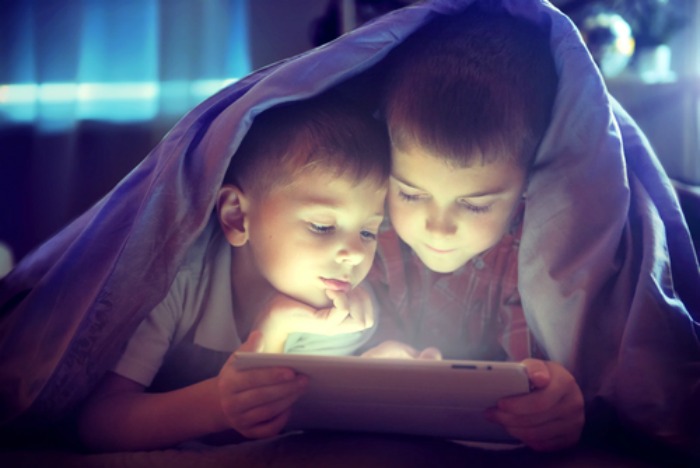We live in a world where computers, smartphones and tablets are a normal part of life. We use them to relax and they are often a necessary component for work. Even our kids know how to use these devices. One in three kids know how to use a tablet and smartphone before they can talk. There is no escaping technology in our lifetime.
But eye-opening studies have found too much screen time for our kids is turning them into digital junkies.
The side-effects of too much screen time include, mood swings, irritability, lack of concentration and lack of interaction with others. Children that spend a lot of time in front of a screen tend to get bored easily and are not interested in the world around them when they’re not plugged in.
One mum, Susan*, explained her son changed when he got involved playing Minecraft. He lost interest in his hobbies like baseball and reading and refused to do his chores. Susan knew the screen time was having a drastic effect on her son when he told he dreamed of cube shapes. One night , Susan found her son in a trance, with the iPad still on next to him, in bed. After this episode, she knew her son had to get help.
Parents know that glowing screens can have a negative impact on kids. It can have a detrimental effect on us if we don’t discipline ourselves enough to peel away from the screen before bedtime. Too much screen time can lead to depression, anxiety and aggression and can even lead to psychotic-like actions, where the screen watcher loses touch with reality.
Many of the famous tech designers and engineers of the world are tech-cautious with their kids. Steve Jobs was well-known for strictly limiting his children’s use of the technology he created.
It’s almost like these creators knew before the researchers did, that screens are a form of a digital drug. In fact, recent brain imaging research found screen time affected the brain’s frontal cortex, which controls impulse control and executive functioning in the same way a drug like cocaine does. Technology also raises dopamine levels which leaves the individual hyper-aroused.
Dr. Peter Whybrow, director of neuroscience at UCLA, calls this addictive effect to screen times, “electronic cocaine” and Chinese researchers call them “digital heroin.” Even the head of addiction research for the Pentagon and US Navy, Dr. Andrew Doan, believes video games and screen technology is digital “pharmakeia” (Greek for drug).
Healthy Screen Time Limits
This excerpt is from Raising Children. They offer the latest guidelines from the American Academy of Pediatrics (AAP) suggest that:
children under 18 months should avoid screen time, other than video-chatting.
children aged 18 months to 2 years can watch or use high-quality programs or apps if adults watch or play with them to help them understand what they’re seeing.
children aged 2-5 years should have no more than one hour a day of screen time with adults watching or playing with them.
children aged 6 years and older should have consistent limits on the time they spend on electronic media and the types of media they use.
So what are parents to do with kids who are adamant about getting more screen time? (And parents who resort to screen time for much needed respite)
Understand that prevention is better than cure.
Once a child has crossed the line into true tech addiction, it can be difficult to treat. The best way to treat the addiction is to detox. And it’s not easy for the child or parent. Detoxing is the first strategy before any other kind of therapy can begin.
The detox requires the removal of technology, including computers, smartphones and tablets. Parents are encouraged to do the detox for 4 to 6 weeks. Encourage screen addicted kids to go outside to play or get creative with toys they already own. Developmental psychologists know a child’s healthy development involves engagement in the natural world, through imaginative play and interaction with others.
Help children connect with meaningful experiences and interact with friends more often. Limit screen time, and prevent your child staying on the screen for an extensive amount of time. Boundaries are essential to prevent your child becoming an addict, or after they’ve learned to control their addiction.
For Susan, it was an upward battle to help her son. She removed his tablet and encouraged him to get back into baseball. As a result, her son is doing much better today, but he can relapse if he doesn’t create relationships with others.
If your child uses an iPad at school, it’s best to limit the tablet usage at home to avoid an addiction. Here are some ways to manage screen time at home.
1. Set up time limits when the iPaid or computer are used.
2. Encourage all meals to be screen free.
3. No screen time at least half an hour before bedtime.
4. Remove all screens – computers, smartphones and tablets from the bedroom.
5. Encourage outdoor play and interactions with friends outside of school to counteract the pull of the screen.
Screen time can be addictive and it can stunt a child’s developmental process. Interaction, creative imaginative play and engagement in the natural world are essential for children as they learn and grow. Screens offer a wonderful way to learn, but they can be addictive without the right disciplines in place.
*not real name











One thought on “Too Much Screen Time is Turning Our Kids Into Digital Junkies”